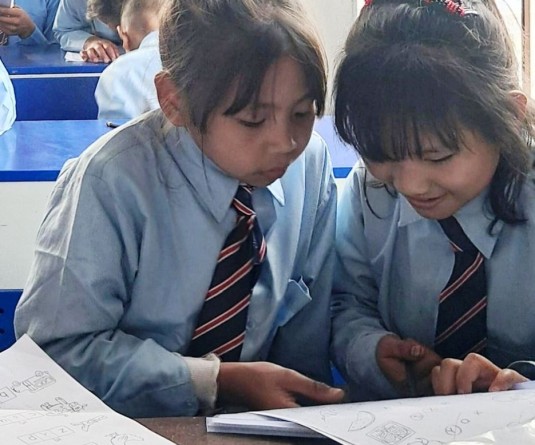Deo Nukhu and other dignitaries with CPLC members during the release of Anglo-Poula (Chakhesang) Dictionary on October 4 in Kohima. (Morung Photo)
 Dictionary.jpg)
Language play vital role in preserving cultural heritage: Nukhu
Our Correspondent
Kohima | October 4
The much-awaited Anglo-Poula (Chakhesang) Dictionary was formally released today by Deo Nukhu, former parliamentary secretary for art & culture and science & technology, Nagaland and convenor Chakhesang Poula Literature Committee (CPLC).
This Poula dictionary is the cumulative work of scholars, language experts and the Department of Art & Culture, Government of Nagaland in a first time effort to document the language of the Poulas from a linguistic perspective.
Addressing the gathering at the Conference Hall of the Directorate of Art & Culture, Kohima, Nukhu on behalf of the CPLC from Razeba area of Phek district, thanked the Department of Art & Culture for publication of this Poula dictionary.
Nukhu said that 2 years ago, the CPLC consisting of 11 members embarked on its endeavour to help the children learn their lessons in their own language by translating English language into Poula.
For two years, he said, the Committee tirelessly worked and took the pain of editing word by word the Anglo-Poula Dictionary.
During this process, Dr. lmlienla Imchen and Dr. Yanbeni Yanthan of Centre for Naga Tribal Language Studies (CNTLS), Nagaland University provided much-needed linguistic knowledge and guidance, he said adding that they contributed in the editorial work of the manuscript and assisted by two Research Assistants Revine Movi and Vibeituonuo Mere of CNTLS, NU, Kohima Campus, Meriema.
So far, Nukhu said that 18 languages of the Naga tribes are recognised and their textbooks developed by the Department of School Education.
It includes; Ao, Chang, Chokri, Kuzhale, Nthenyi, Nzonkhwe, Liangmai, Zeme, Lotha, Sumi, Tenyidie, Phom, Konyak, Yimkhiung, Khiamniungan, Kuki, Pochury and Sangtam and whereas four Anglo-Dictionaries published earlier by Art & Culture includes Lotha, Phom, Sumi, and Yimkhiung.
Stating that today’s release is fifth Anglo-Dictionary published in Chakhesang-Poula, Nukhu said “It is my hope that the Anglo-Poula Dictionary will not only help the younger generation in learning their language but also help the Poula-speaking community and the rest of the Chakhesang or Naga people in general.”
‘Your language is your identity’
Nukhu maintained that language play a vital role in preserving the cultural heritage.
According to the United Nations data on Multilingual Education in 2024, currently 40% of the global population lacks access to education in their native language.
UN Research data has reaffirmed that native languages used in education fosters self-esteem, critical thinking and better learning outcome in the learner, he said.
The UN World Indigenous Peoples Report states that 'every two weeks a language disappears taking with it an entire cultural and intellectual heritage, and that atleast 45% of the estimated 7000 languages spoken in the world are endangered.
“As indigenous languages face the threat of extinction, the need for preservation has become crucial,” he said.
“Your language is your identity, so it is very important to develop and preserve your God-given language,” Nukhu said adding that the publication of Anglo-Poula Dictionary is a first initiative towards the literature development.
He informed that the CPLC is also working on its next phase of textbook publication, i.e translating "Nagaland Heritage" SCERT textbooks of Classes 1 - 3 in Chakhesang-Poula.
Meanwhile, Nukhu commended the role of the Department of Art & Culture as custodians of Naga culture, tradition, art, and historical accounts.
“Your task as an institution is important in preserving and sharing these vital elements to the present and future generations. Your work keeps our rich heritage alive, informs us and will hopefully inspire the next generation,” he said.
“We all have a collective responsibility in preserving language in its oral and literature form. May this Anglo-Dictionary in Chakhesang Poula enrich our collective identity as Naga people and help in preserving the unique languages of our Naga people,” Nukhu added.
‘Anglo- Poula dictionary highlights cultural wealth’
Dr Imlienla Imchen, Assistant Professor, Nagaland University said that the Anglo-Poula (Chakhesang) Dictionary is the result of collaboration and dedication from linguists, researchers and members of PCLC.
This project reflects the Department's (Art & Culture) commitment towards preserving and promoting Indigenous languages in an era where many are getting endangered, she said.
This dictionary is not just a linguistic achievement, it also highlights the cultural wealth and traditional knowledge embedded within the language. In this sense, the Poula Chakhesang dictionary is a living document that ensures the survival of not only words but the cultural knowledge that these words carry, she said.
Dr. Imchm said that each entry has been meticulously reviewed by PCLC, ensuring that Poula language is represented with the respect and authenticity it deserves.
The entry of the sounds transcribed in the form of International Phonetic Alphabet (IPA) has been carefully examined and analyzed with sound softwares.
This dictionary is a vital resource for academics, linguists and future generations of Poula speakers. It serves as an educational tool, a cultural bridge and as a means to foster identity and pride within the community, Dr. Imchen added.
Earlier, the formal programme was chaired by Meseno Peseyie, Joint Director, Art & Culture while welcome address was delivered by Imtitemsu, Joint Secretary to the Govt of Nagaland, Department of Art & Culture.
Rev Vikuo Rhi, Associate Pastor, Chakhesang Baptist Church Kohima pronounced invocation while Zhavame Women Society Kohima presented folk tune.
Vote of thanks was proposed by Adela Moa, Director, Art & Culture, Kohima. The book is priced at Rs 500.





